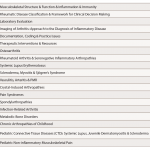“When I was hired into a rheumatology practice, I realized I needed to widen my knowledge base and acquire new clinical skills for this field,” says Brandi Young, NP-C, an NP at North Mississippi Health System in Tupelo. Likewise, Dolores Langford, Msc, BscPT, CHT, CAFCI, regional clinical resource physical therapist for orthopaedic and musculoskeletal populations in Vancouver, British Columbia, wants “to fill in information gaps that I can’t do by reading the literature. I want to dig deep to a level of complexity that allows me to supplement my clinical skills base.”
As a PA in a rheumatology practice for the past six years, Laurie Hughell, PA-C, MPA, of Mercy Arthritis and Osteoporosis Clinic in Des Moines, Iowa, finds the course to be a “unique opportunity—the best tool available for physician assistants and nurse practitioners to advance their knowledge of rheumatology.” Mary Kiely, ANP, who works for the Infusion Service at New York University Langone Medical Center’s Center for Musculoskeletal Care, says the course clarifies “the role of the nurse practitioner in the rheumatology subspecialty and the partnership between caregivers and patients with rheumatic diseases.”
How do graduates apply what they learn? Young credits the course’s structured physiology presentation with focusing and organizing her thought processes when she performs initial evaluations. “The course enables me to evaluate referrals’ appropriateness and learn which diagnostic tests to order when patients present to our practice.”
Some participants use the ARC as an ongoing reference. “The continuing access to the module content is a great resource—like a security blanket,” Langford says. “I can refer back to the modules as clinical scenarios arise.” She remembers a patient diagnosed with knee osteoarthritis whose examination revealed psoriatic plaques and enthesitis; because of the course content, Langford knew to ask additional questions that led to further investigations for psoriatic arthropathy. “I also refer back to the imaging interpretation module because I often use the patient’s X-rays as a teaching tool about his or her condition,” Langford adds.
Hughell found the radiology module particularly useful: “It helped me learn how to interpret hand X-rays. The laboratory section is also very helpful.”
Kiely believes that the course helped her understand radiographic change over time, which allows her to meet treat-to-target goals for rheumatoid arthritis, thus saving joint mobility. “The self-assessments are very beneficial,” Kiely says. “I could evaluate my understanding of the pathology, triage, and treatment protocols of rheumatic diseases.”
A Broader Perspective
In addition to augmenting the information and skill bases of the course enrollees, the ARC addresses the issue of the growing shortage in the rheumatology workforce. The course prepares nurse practitioners, physician assistants, and other clinicians to assume a larger role in the evaluation, care, and education of patients in rheumatology practices. Improved patient care is an obvious outcome, but it is also important that rheumatologists see that professional training for health professionals is available and can increase the productivity, efficiency, and care quality of their practices. “Mid-level providers are able to help rheumatologists with their patient load by providing quality rheumatologic care,” explains Hughell.



